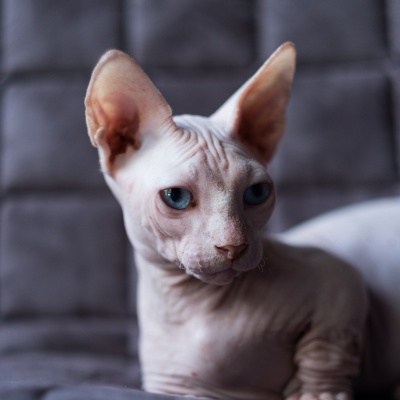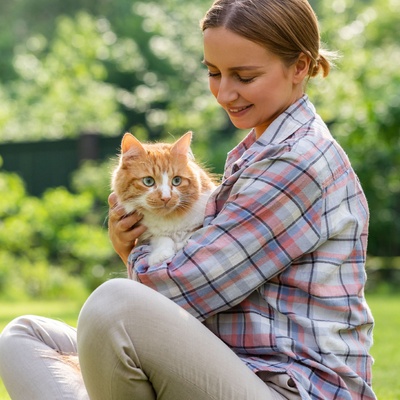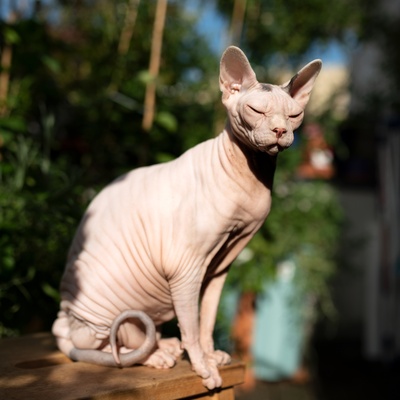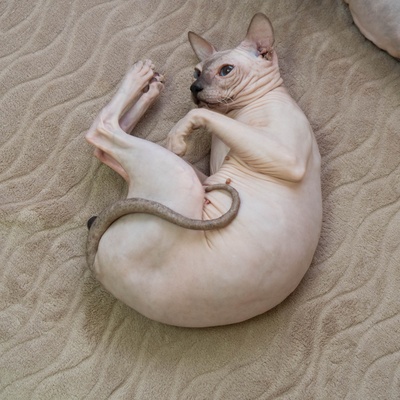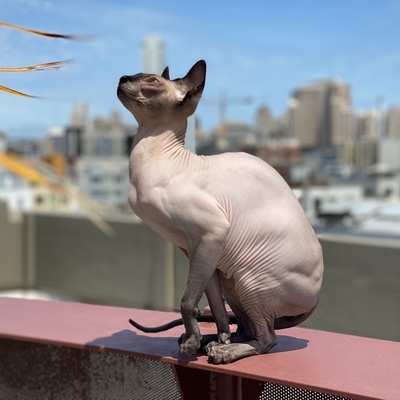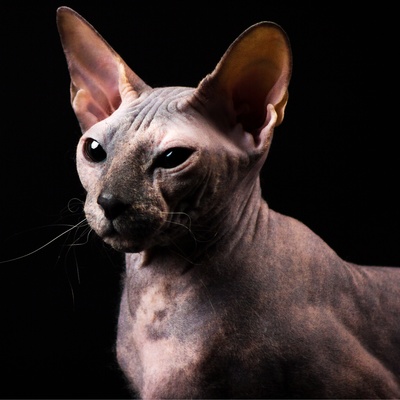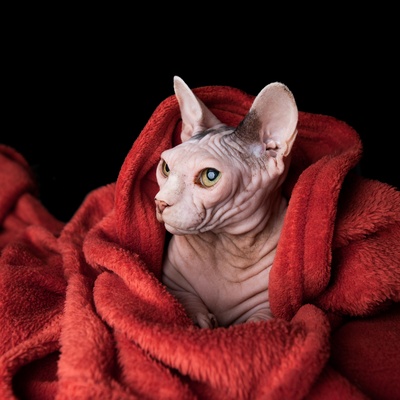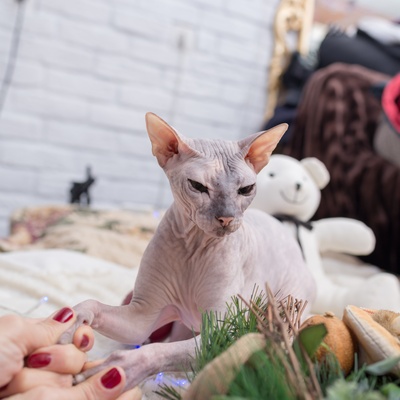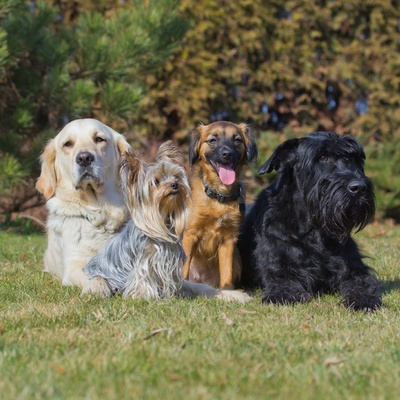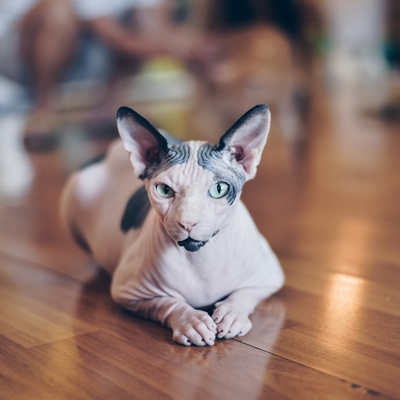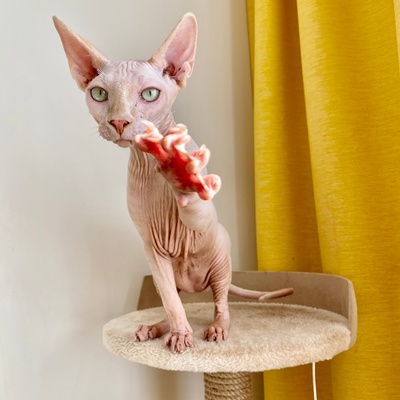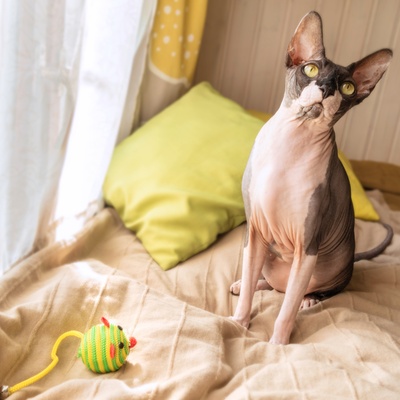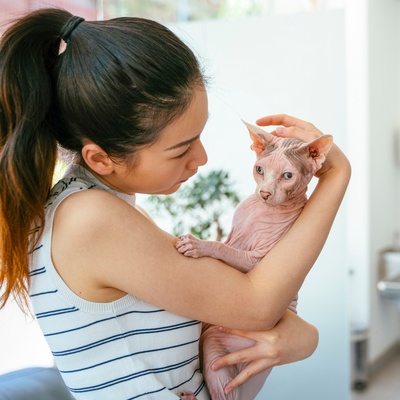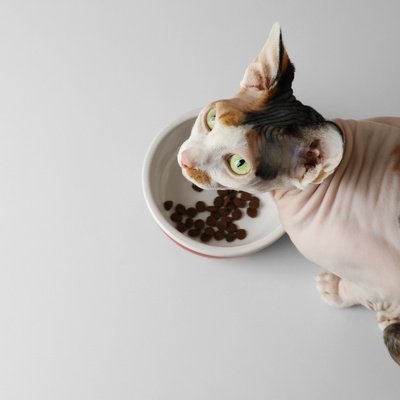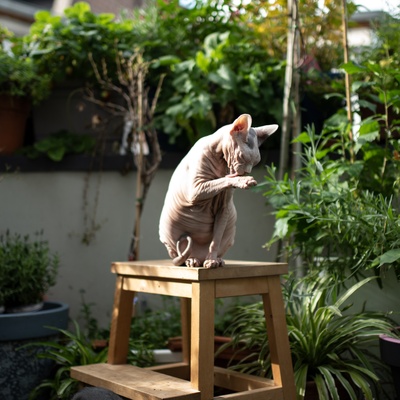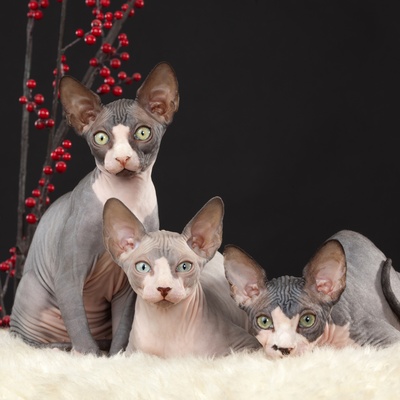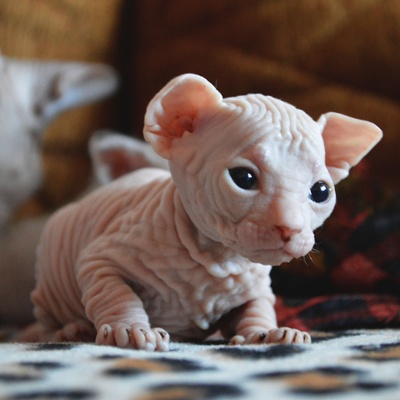Introducing the Donskoy
An essential guide for anyone considering adopting a Donskoy. Includes information on how to choose your cat and ensure their health and wellbeing.
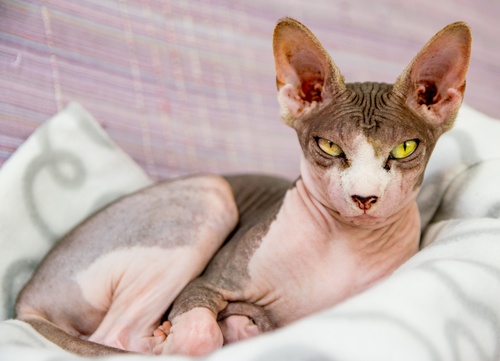
An essential guide for anyone considering adopting a Donskoy. Includes information on how to choose your cat and ensure their health and wellbeing.
The Donskoy cat is a fascinating breed that stands out in the feline world. Originally from Russia, this breed emerged from a natural genetic mutation that resulted in its distinct hairless appearance. With its muscular build, wrinkled skin, and expressive almond-shaped eyes, the Donskoy commands attention and admiration. This breed is known for its warm, rubbery skin which feels like a hot water bottle when cuddled. Donskoys are highly social, affectionate, and intelligent cats.
They thrive on human interaction and are known to follow their owners around, participating in daily activities with curiosity and enthusiasm. Despite their somewhat alien appearance, Donskoys are warm-hearted companions who form deep bonds with their families. Their playful nature and love for adventure make them an entertaining addition to any home. With the right care and attention, a Donskoy can bring endless joy and a touch of the extraordinary into your life.
This selection outlines the unique features of the Donskoy breed of cat.
The Donskoy is a medium-sized cat, generally weighing between 8 to 12 pounds, with a sturdy and muscular build.
The Donskoy is known for its hairlessness, with a skin that can range from completely bald to a peach-like fuzz.
Despite common beliefs, the Donskoy is not hypoallergenic due to its hairlessness, but it may be less likely to trigger allergies compared to furry breeds.
The Donskoy's skin can mimic a variety of colors and patterns seen in furred cats, from solid to tabby, allowing for a diverse appearance within the breed.
Donskoys adapt well to indoor living, appreciating warm environments to compensate for their lack of fur.
Donskoys are exceptionally sociable and affectionate, enjoying the company of humans, children, and other pets, making them great companions for a family setting.
Donskoys are generally healthy but can be prone to skin issues due to their hairlessness. Regular skincare is essential to prevent problems.
Donskoys are intelligent and curious, making them relatively easy to train with patience and positive reinforcement, thriving on mental stimulation and interaction.
We can help you!
Every cat has its own character and specific needs. Making the right choice will ensure his well-being and yours.
Thanks to our quiz, you'll know which breed is right for you, depending on your lifestyle, expectations and many other criteria.
Don't wait any longer and take the quiz to find out the answer!
The Donskoy is renowned for its distinctive hairless appearance. Its smooth, hairless skin is as unique as a sculpture, setting it apart in the feline world.
The Donskoy is a medium-sized cat, exuding elegance with its slender but muscular build. Males are generally heavier than females, with males weighing between 10 to 14 pounds and females ranging from 8 to 12 pounds.
Unlike many other breeds, Donskoys mature more slowly, reaching their full size and muscular maturity around 3 to 4 years of age. Beyond their hairlessness, they possess a robust frame, a strikingly athletic build, and a long, tapering tail that adds to their graceful appearance.
The Donskoy stands out in the feline world with its unique coat — or lack thereof. This breed is characterized by its hairlessness, though some individuals may have a fine down. This gives the Donskoy a distinctive texture, with the skin feeling warm and soft to the touch, akin to a peach.
Despite lacking a traditional fur coat, the Donskoy displays a variety of skin colours that mirror the diverse palette of furred breeds. Their skin can showcase shades ranging from black, white, and grey to more vibrant colours like blue, red, and cream. This versatility in colour enhances their unique appeal, allowing each Donskoy to have its own distinctive look.
The Donskoy's allure doesn't stop at its hairless skin. This breed boasts a medium-sized, muscular frame that moves with an elegant, graceful gait. Its ears are large, wide at the base, and upright, tapering to a rounded tip, giving it an alert appearance. The body structure of the Donskoy is marked by a well-developed musculature, showcasing a strong bone structure beneath its smooth skin.
The Donskoy's muzzle is short and well-defined, with a strong chin that adds to its distinctive profile. Its eyes are almond-shaped, medium in size, and can come in a variety of colors, including green, blue, and hazel. These physical traits combine to give the Donskoy its unique and captivating appearance, distinguishing it from other cat breeds.
Despite its lack of fur, the Donskoy requires specific grooming attention to maintain its skin health. Regular bathing is essential for this breed, with a recommendation of once a week to keep its skin clean and to prevent oil buildup. The use of a mild, cat-appropriate shampoo is advised to avoid drying out their sensitive skin.
While Donskoys do not shed hair like furred cats, they still benefit from gentle wiping or brushing to remove any dead skin cells. It's important to remember that while cats are adept at grooming themselves, the Donskoy's unique skin needs make a regular, gentle washing routine beneficial for their overall well-being.
The Donskoy is an affectionate, sociable cat. A true companion that thrives on interaction!
The Donskoy cat is the epitome of sociability and warmth. Known for their intense bond with humans, these cats quickly become an integral part of the family, often following their owners from room to room. They crave attention and are not shy about demanding it, using a variety of vocalizations from soft purrs to more insistent meows to communicate their needs.
Despite their active nature, Donskoys equally cherish long cuddle sessions, making them the perfect lap cats. The presence of a dedicated owner who can provide the affection and engagement they require is crucial for their well-being.
With their distinctive appearance, Donskoys bring a unique temperament to match. They are gentle, patient, and surprisingly easygoing, making them fantastic family pets that get along well with children and other animals. Their sociable nature doesn't wane in the face of new faces or pets; instead, they welcome the company with calm curiosity.
When overwhelmed, Donskoys prefer to retreat quietly and find a peaceful spot to relax, rather than displaying aggression. This serene approach to life, combined with their affectionate demeanor, ensures that the Donskoy cat enriches the lives of those around them with love and gentle companionship.
Take the test and find out the dog breed that matches your personality and lifestyle.
The Donskoy cat's adaptability to different living environments is remarkable, thriving equally in spacious houses or cozy apartments. However, their need for human companionship is paramount; they do best when they can share their space with their beloved owners.
Ideally, Donskoys should live in environments where they can freely explore and engage with their surroundings, but the presence and interaction with their owner are crucial to their happiness. While they are not overly demanding in terms of space, providing areas for climbing and exploration can greatly contribute to their physical and mental well-being. If you're worried about losing track of him, you can fit him with a GPS collar so you can track his movements and locate him if he escapes.
The Donskoy's lively and curious nature requires more than just physical space; it demands intellectual engagement. Regular play sessions that challenge their clever minds and expend their energy are essential to prevent boredom, which can lead to mischief. Interactive toys and games that foster bonding with their owners not only enhance their happiness but also mitigate any potential for destructive behavior.
Despite their sociable nature, Donskoys also appreciate having quiet, comfortable spots where they can retreat for some peaceful rest, ensuring a balanced environment for activity and relaxation.
Education for the Donskoy cat should begin at a young age, emphasizing the importance of establishing a foundation of trust and understanding early on. Training this breed requires a gentle approach, focusing on positive reinforcement, consistency, and patience. Rewards and affirmations for good behavior reinforce desired actions, while firmness—without harshness—helps set boundaries.
Incorporating play into training sessions not only makes learning more enjoyable for the Donskoy but also serves as an excellent opportunity for mental stimulation, helping to prevent undesirable behaviors. With their intelligent and affectionate nature, Donskoys respond well to engaging, loving training methods, making them delightful companions.
The Donskoy is an exceptionally resilient and robust cat breed, known for its overall good health. Despite its unique appearance, this breed does not present specific health problems related to its hairlessness, making it a hardy companion.
The Donskoy, with its distinctive hairless physique, is generally considered a healthy breed that rarely suffers from frequent illnesses. However, like many cat breeds, they may be at risk for certain hereditary conditions, such as feline hypertrophic cardiomyopathy (HCM) and polycystic kidney disease (PKD). Advances in veterinary science have made it possible to conduct DNA testing to identify these conditions early, potentially preventing their transmission to offspring.
Regular veterinary check-ups are crucial for maintaining the Donskoy's health, with vaccinations against common diseases like feline distemper and rabies being essential components of their healthcare routine. The unique skin of the Donskoy also necessitates special attention to avoid issues such as acne or sunburn, underscoring the importance of a tailored approach to their care.
The Donskoy's distinctively muscular build and medium size demand a high-quality diet to maintain their health and physique. High-quality kibble, rich in essential nutrients, serves as an excellent foundation for their daily dietary needs. To complement this base and promote optimal hydration and kidney function, adding green vegetables rich in water content can be beneficial. Such a balanced approach ensures the Donskoy retains its lean muscle mass while supporting overall health.
The Donskoy matures at a moderate pace, reaching its full size and musculature around 2-3 years of age. Given this gradual growth, it's important to adapt and control their diet to prevent overfeeding or underfeeding. Consistency in the brand and type of kibble helps maintain dietary stability, while scheduled feeding times aid in regulating their digestive system. This careful management ensures the Donskoy develops properly, avoiding any growth-related health issues.
Despite their serene appearance, Donskoys are quite active and enjoy engaging in play and exploration. This breed's tendency to be lively necessitates a diet that matches their energy output to prevent weight gain.
Encouraging regular exercise through interactive play, running, and jumping not only keeps them fit but also strengthens the bond between cat and owner. Ensuring a balanced diet while promoting an active lifestyle is key to maintaining the Donskoy's health and preventing obesity.
If you're considering adding a Donskoy to your family, you're looking at a unique and cherished breed. There are a select number of breeders specializing in Donskoys, highlighting the importance of careful consideration before adoption.
Donskoys, being a less common purebred cat, are typically bred by specialized breeders or in small catteries. It's crucial to visit these places in person to assess the cats' living conditions, ensuring they're healthy and well-cared for.
Lastly, it's crucial to remember that mandated electronic identification, like microchipping, for dogs and cats isn't a legislative obligation that is consistently enforced in the US. Even in the absence of national regulations, microchipping is generally acknowledged as a reliable method of permanently identifying pets, greatly increasing the likelihood of lost pets being reunited with their owners.
Confirming the health screenings and DNA tests of both the kitten and its parents is essential to avoid hereditary health issues and ensure ethical breeding practices.
The cost of a Donskoy kitten can vary widely, influenced by factors such as lineage, pedigree, the breeder's reputation, and the cat's age. Typically, prices for Donskoy kittens range from
to
, depending on these variables. Adopting an adult Donskoy might offer a more cost-effective option.
Beyond the initial purchase price, prospective owners should consider the lifelong care costs, including nutrition, healthcare, and grooming. Donskoys are known for their robust health but require specific care for their skin. Annual expenses for maintaining a Donskoy cat can vary, but preparing for ongoing care is essential for the well-being of this distinctive and affectionate breed.
Choosing a cat that matches your personality and lifestyle will ensure your well-being and his!
